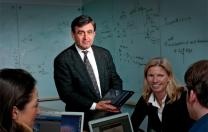Harvard offers a panoply of “active learning” opportunities in its various faculties. The new Harvard Initiative on Learning and Teaching (see “Investing in Learning and Teaching,” January-February) will stimulate a wide range of ventures and explorations in this and other areas, which have already begun.
Examples of active learning abound in the curriculum. Here are three:
At Harvard Business School, the Field Immersion Experiences for Leadership Development (FIELD) program in January sent the entire first-year class of 900 M.B.A. students abroad to placements with multinational or local companies. Working in small teams with a faculty adviser, the students were assigned to analyze a new product or service the company might introduce in the country visited—a hands-on immersion that goes beyond the school’s traditional classroom case-based method of teaching (see “Educating Business Leaders for a Global Century,” September-October 2011 and “Into India” from March-April 2012).
The General Education course United States in the World 24: “Reinventing Boston: The Changing American City,” taught by Ford professor of the social sciences Robert Sampson, requires students to make three visits to Boston neighborhoods and write descriptive accounts of their observations and experiences. It embodies a specific form of active learning known as “activity-based learning” (ABL) in which students do public service, fieldwork, community-based research, and internships, then connect their real-world exploits with academics (see “Out of Cambridge,” January-February).
Elise Morrison, an associate director of the Bok Center with a Ph.D. in theatre and performance studies, teaches Expository Writing 40: Public Speaking Practicum. Each class member delivers five speeches during the semester, on topics progressing through a gradient of difficulty, starting with a self-introduction and climaxing with an attempt to persuade the audience of something that it disagrees with. Video recordings and feedback from both Morrison and fellow students focus on the speaker’s unconscious habits and their communicative consequences.








